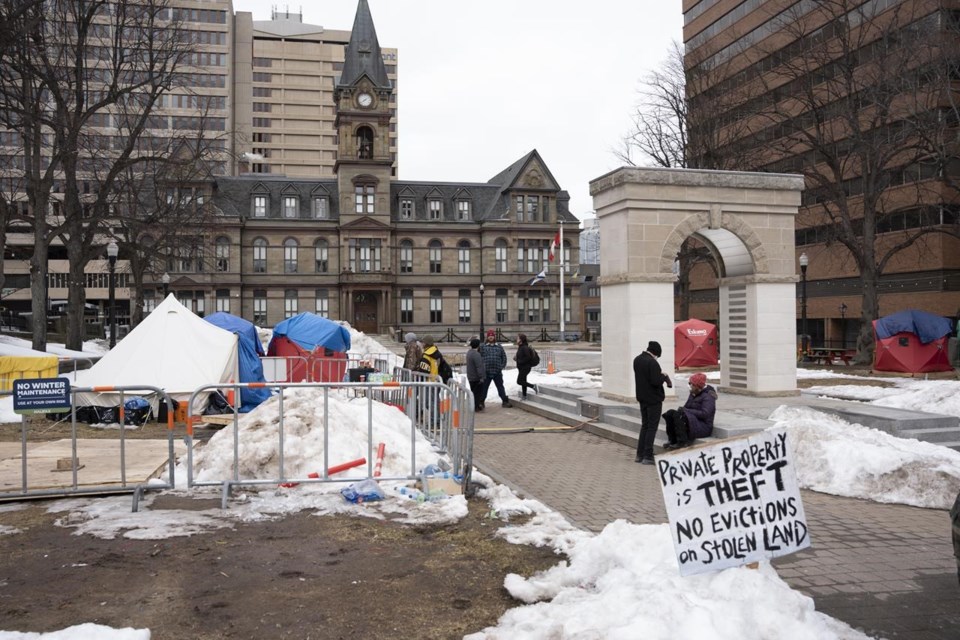Halifax officials delivered on a promise Friday to cut electricity to the dozen or so people living in a homeless encampment set up last fall outside city hall.
As of 9 a.m., all but one of the 12 remaining tents in the public square known as Grand Parade had no heat source as the temperature hovered around -11 C and a westerly wind made it feel like -19 C.
"Here we are on one of the coldest days of the year and they're turning off the power," said Steven Wilsack, a volunteer who for the past three months has been helping encampment residents. "The system is broken."
Wilsack said he asked government officials to leave a generator running during the cold snap, but he said his request was ignored.
"This is just another trigger that is going to put people over the edge," Wilsack said in an interview as he surveyed the square from inside a parked truck. "People could freeze." He said one tent has a propane heater.
Among those staying at the site are a pregnant woman and her partner, another couple, one resident who is battling chronic pain and a number of other people who are dealing with mental illnesses or addictions, he said.
"They are people who are broken," Wilsack said.
As winter was arriving last year, many of the tents in the square were kept warm with propane heaters. But a fire in January that injured one person raised concerns about safety, and most of the residents switched to electric heaters when the generator arrived.
On Feb. 7, however, the municipality tied eviction notices to tents in the square and did the same at another four of the region's 11 authorized encampments. The notice said the deadline to leave was this past Monday.
On Wednesday, the city followed up by announcing the electricity supply would be cut, and officials have said any personal items that have not been removed or packed for storage would be thrown out.
As the generator was shut down Friday, a six-metre long dumpster was placed in the middle of the snow-covered square, not far from the city's main war memorial.
City officials have said the encampments are a safety risk, and they say better housing options are available, including at the Halifax Forum, which offers a makeshift shelter with 70 beds in the north end of the city.
However, some unhoused residents say the beds at the Forum — separated by curtains — are worse than tents because there's a lack of privacy and security.
"Personally, I wouldn't put my dog in the shelter," Wilsack said, adding that he's heard there continue to be problems at the Forum with drug abuse and violence.
"A couple of residents have said it's even worse than a jail .... We have people here who look out for each other. They would rather stay in these conditions than put themselves in harm's way at a shelter."
Earlier this year, the Grand Parade encampment was home to as many as 30 people. That number dropped to 15 or 20 last week.
As of Wednesday, the city said about 29 people remained at unauthorized encampments.
Last month, Canada's federal housing advocate Marie-Josée Houle released a scathing report saying unhoused people have a fundamental right to live in encampments. She said that right is violated when authorities tear them down.
Houle said the spread of homeless encampments across the country is a national human rights crisis that is the result of Canada's "persistent failure" to protect people's right to housing, which Ottawa officially recognized in 2019.
In the meantime, authorities need to equip encampments with basic services, such as clean water and garbage removal, so residents can live in dignity, her report said.
This report by The Canadian Press was first published March 1, 2024.
Michael MacDonald, The Canadian Press



